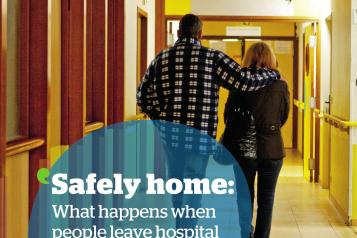People share their experiences of being discharged from hospital

In our new briefing - What happens when people leave hospital and other care settings? – we share what over 2,000 people told local Healthwatch about their experiences of being discharged.
Whilst many initiatives have been introduced since we first reported on this issue in Safely home back in 2015, there is still significant room for improvement.
What do the numbers tell us?
-
In July 2017, the latest month for which data is available, an average of 5,861 NHS beds a day were occupied by patients who don’t need them.
-
This is up 23.4% compared with July 2015 when we published our first report.
-
Last winter the delayed transfer of care figures hit an all-time high with an estimated 5.6% of the 131,000 NHS beds occupied by people who no longer needed them.
-
The majority of delays are still caused by the NHS (55.9%).
-
There has been a significant increase in the number of delays attributed to social care services, which now represent 37.4% compared with 30.4% two years ago.
What do people tell us?
Our new briefing looks at what 46 local Healthwatch have heard from people during the last two years. The three main issues they identified were:
-
People still don’t feel involved in decisions. We heard that people often aren’t given the information they need, such as about their medication or where to go for help out of hours.
-
People continue to experience delays and a lack of co-ordination between services. Many people had to stay in hospital longer than necessary because of long waits for medication and transport, and because care homes or family members were not notified that they were about to be discharged.
-
People feel left without the support they need after leaving hospital. People told Healthwatch about leaving care without adequate care plans or ongoing support in place, which in some cases led to readmissions.
However, we also heard about instances where changes have been made to make leaving care better.
When Healthwatch Kent found that a third of people they spoke to didn’t feel involved or listened to during their discharge from hospital, they told their local trust. As a result, the trust introduced measures to help staff provide the right support, such as arranging visits to local care homes and other services to help them understand what people need.
There has also been a significant focus on encouraging patients to ask questions about their discharge plan to help them understand the full range of options available to help them recover.
With this report, we’re calling on health and social care services to listen to people’s experiences of leaving care to help improve the process.
Imelda Redmond, National Director of Healthwatch England, said:
“Getting people out of hospital and safely home is not about a single point in time. It is an ongoing process that requires thought, planning and support before, during and after the moment someone is actually discharged. Things work best when staff in all services work together to provide a seamless experience.
“Whilst we heard plenty of positive stories from people moving between hospitals, care homes and their own homes, the number of people stuck in hospital waiting to leave has increased significantly. From what people tell us, it is clear many of the common problems around communication and coordination are still ongoing. Healthwatch will continue to play our part, working with hospitals, community services and the public to improve people’s experiences.”


